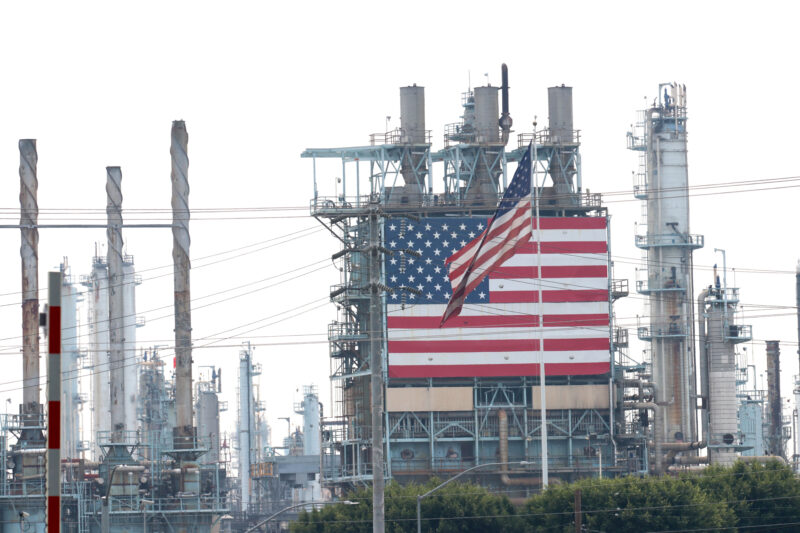By John Haughey
Contributing Writer
The California Energy Commission has tabled a resolution calling for a pause in implementing a 2023 state law that would impose financial penalties on gasoline producers accused of accruing “excess profits” while “price gouging” consumers.
“Given the timing of this, we felt like it was best to have more time for public input and engagement in these issues and get that feedback,” CEC Deputy Director Jeremy Smith told the four-member panel during its Wednesday meeting in Sacramento.
“This is a really important decision for the commission to consider, and so [staff] felt that was the best course of action at this time,” he added, noting the proposal would be on the commission’s Sept. 10 agenda.
The measure suspending implementation of the “max margin and penalty” provision was one of two prospective resolutions pulled from discussion with the other, a “recommendation not to govern the timing of refinery maintenance events,” also tabled until next month.
In March 2023, California’s Democratic-dominated Legislature passed Senate Bill X1-2, designed to temper alleged “price gouging” by oil companies within the state.
California has the nation’s highest gas prices, largely because it also imposes the nation’s steepest taxes on transportation fuels — a 61.2-cents per gallon excise tax and 2-cent per gallon underground storage fee, in addition to state and local sales taxes, for an aggregate average above 72 cents.
Combined with the 18.4 cents per gallon federal excise tax, Californians pay nearly $1 per gallon just in taxes.
The state’s regulatory requirements put additional burdens on industry and result in more costs passed along to consumers, costs imposed by design as part of Gov. Gavin Newsom’s goal to phase out petroleum-based fuels by 2045.
While gasoline prices spiked nationwide during the COVID pandemic and in the wake of Russia’s February 2022 Ukraine invasion, the impacts were felt most acutely in California, where the cost of regular unleaded gasoline in parts of the state ballooned beyond $7.50 a gallon in 2023.
Regular unleaded gas prices in California were $4.50 a gallon on Wednesday, nearly $1.35 per gallon more than the national average, according to AAA.
The 2023 law requires the commission to establish a “profit threshold,” then develop penalties that could be assessed on revenues above that.
While the commission has posted a guide on how it would define that threshold and how it would implement the law, it has not done so.
And now the issue may be, at least for the foreseeable future, moot after two major oil companies announced plans to close California refineries, raising alarm about shortages that could further raise gasoline prices in the state.
Phillips 66 plans to shut down a Los Angeles-area refinery, and Valero is ceasing operations at a Benicia refinery by the end of 2025, which the commission warns would slash in-state refining capacity by more than 17%.
‘Mid-Transition’ Adjustment
In response to Phillips 66’s and Valero’s pending refinery shutdowns, Newsom dispatched an April letter to the commission, specifically requesting that Vice Chair Siva Gunda “redouble the state’s efforts to work closely with refiners.”
Newsom said accommodation with the oil and gas industry will ensure Californians have access to reasonably priced transportation fuels and that “refiners continue to see the value in serving the California market” as the state advances through its “mid-transition” phase from fossil fuels.
Gunda responded June 27 with an outline of recommendations that call for boosting in-state crude oil production — especially in Kern County —upgrading port infrastructure to increase marine imports of refined oil, pausing implementation of the still-undetermined profit cap, and doing away with refinery regulations to be imposed under the 2023 law.
“During this mid-transition phase,” he wrote, “the state must simultaneously continue supporting the rapid expansion of new clean, alternative fuels while actively managing a gradual, responsible phase-down of the incumbent systems that millions of Californians will continue to depend upon for years to come.”
Gunda, also the UC Davis Energy and Efficiency Institute director of research, said the state can still “evolve” its plan to phase out fossil fuels by 2045 “while protecting communities, workers, and consumers, and foster market conditions that support the industry’s ability to operate safely, reliably, and successfully to meet demand through the transition.”
His 25-page outline of recommendations was presumably incorporated into the resolutions that were to go before the commission, although they were not posted on the Wednesday agenda, so it was not necessarily a surprise that discussion on them was tabled.
“We’ve identified a number of different strategies … including providing a pause on the gross margin penalty … proceeding in a way that gives us a time to be deliberative again,” Gunda told fellow commissioners.
“So when we take the totality of the work,” he continued, “we have the necessary time to consult with all the stakeholders, especially the margin penalty. We firmly believe that it needs to be paused, but the length of time and the context of framing of that is important to be finalized deliberately.”
CEC Deputy Director Smith concurred.
“These recommendations come from the staff working tirelessly on these issues and are backed by a lot of research and collaboration with stakeholders, and so we do feel strongly that these are the right actions,” he said, reiterating, “We do feel strongly that these are the right steps to take, that we do plan to bring these items up for consideration” in September.
Commissioner J. Andrew McAllister said: “I just wanted to double down on that.
“It’s a very divisive issue, and I think having your approach to really build bridges and nurture relationships is key to getting towards a really grounded, workable solution.
“Getting off of fossil fuels is not going to be easy,” he continued, “and this is kind of the tip of the spear.”









